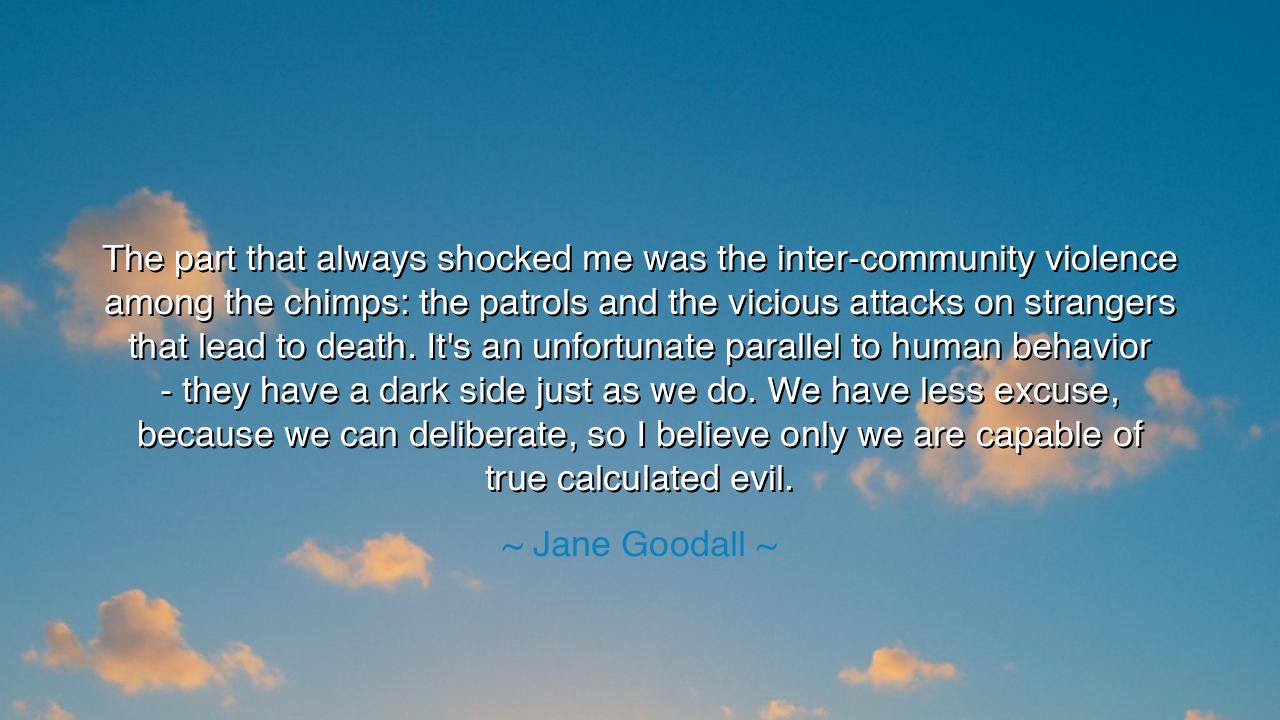
The part that always shocked me was the inter-community violence
The part that always shocked me was the inter-community violence among the chimps: the patrols and the vicious attacks on strangers that lead to death. It's an unfortunate parallel to human behavior - they have a dark side just as we do. We have less excuse, because we can deliberate, so I believe only we are capable of true calculated evil.






“The part that always shocked me was the inter-community violence among the chimps: the patrols and the vicious attacks on strangers that lead to death. It's an unfortunate parallel to human behavior—they have a dark side just as we do. We have less excuse, because we can deliberate, so I believe only we are capable of true calculated evil.” Thus spoke Jane Goodall, the great naturalist and moral philosopher of our age, who looked into the eyes of our closest kin and saw both the reflection of our gentleness and the shadow of our cruelty. In this reflection lies a profound and sobering truth: that violence is not alien to life—it is part of the primal order—but that evil, the deliberate choosing of destruction, belongs to humankind alone.
The origin of this quote arises from Goodall’s years among the chimpanzees of Gombe, where she shattered the myth of nature’s innocence. For years, she watched these creatures live in harmony—nurturing their young, grooming one another, forming bonds of affection. But then she saw what few had imagined: groups of chimps patrolling their borders, waging war against neighboring bands, tearing apart intruders with a savagery that mirrored the bloodlust of human conflict. It was a revelation that shook her to the soul. For in them she saw the ancient roots of our own violence, and yet, she knew that unlike them, we possess the power of reflection—the ability to choose otherwise—and so, our violence carries moral weight.
What Goodall discovered was not just the dark side of nature, but the distinction between instinct and intention. The chimpanzees fought to protect territory, food, and survival. Their aggression, though horrifying, was born of nature’s indifferent law—the struggle to endure. But humankind, armed with reason, crosses into a different realm. We have the capacity to pause, to deliberate, to weigh good and evil. And when, despite that capacity, we choose cruelty—when we plan, deceive, and destroy with awareness—then our actions cease to be natural violence and become true evil. It is this deliberate choice, born from intellect yet devoid of compassion, that marks the tragedy of our species.
History offers countless mirrors to this truth. Consider the story of Adolf Eichmann, the bureaucrat of death who organized the transport of millions to their destruction during the Holocaust. He did not kill with his own hands; he killed through obedience, efficiency, and reason divorced from conscience. He showed how calculated evil can wear the face of order, how the human mind, stripped of empathy, can become more monstrous than any beast. The chimpanzee kills from fear or hunger, but man kills from ideology, pride, and the cold pursuit of power. That, Goodall reminds us, is the sin of a species that knows the difference between right and wrong and yet chooses wrong all the same.
And yet, Goodall’s words are not without hope. In recognizing our dark side, she calls us to rise above it. The same mind that can calculate destruction can also deliberate compassion. The same hands that build weapons can build peace. The awareness of evil is the first step toward overcoming it. For though the shadow of violence dwells in our nature, so too does the light of conscience—that divine whisper that tells us we can do better, that we must do better.
Her insight is both a warning and a charge: that self-knowledge without morality is dangerous, and that intellect without empathy breeds monsters. To live as humans, and not as beasts, we must unite reason and mercy. We must teach our children not only how to think, but how to feel rightly. The gift of deliberation that distinguishes us from other creatures must be used to heal, not to harm; to create, not to conquer.
The lesson, then, is eternal: do not take pride merely in the power to reason, but in the power to choose goodness. To recognize the darkness within is not despair—it is wisdom. To face it, and still choose compassion, is greatness. As Goodall’s life shows, the path forward lies not in denying our kinship with the beasts, but in honoring the sacred responsibility that comes with awareness.
So remember, O listener: the chimpanzee may have its dark side, but we have conscience—and that conscience is our hope, our burden, and our redemption. If we must be the species that can deliberate, then let us deliberate always toward mercy. For it is not instinct that defines us, but the choice to rise above it, to be the guardians of the light we alone can see.






AAdministratorAdministrator
Welcome, honored guests. Please leave a comment, we will respond soon